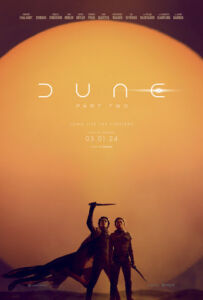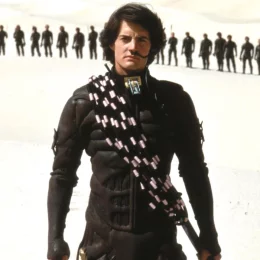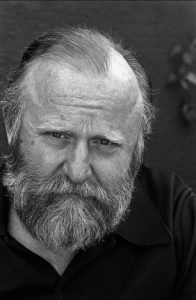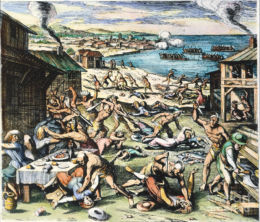Morgoth (Substack, Odysee) was Greg Johnson‘s special guest on the latest broadcast of Counter-Currents Radio, where they discussed Denis Villeneuve’s new film Dune: Part Two and of course answered listener questions. In the second hour, they were joined by Endeavour (Substack). (See Trevor Lynch’s reviews of Dune and Dune: Part Two for Counter-Currents; also see our Frank Herbert commemoration for links to all our resources on Dune and Frank Herbert.) (more…)
Tag: Dune
-
Frank Herbert’s original novel Dune (1965) is a brilliant synthesis of the futurism of science fiction and the archaism of fantasy literature. Denis Villeneuve’s continuing film adaptation Dune: Part Two is now in theaters. It is a bit better than the first part, but has all the same problems, and a few new ones, so I can’t recommend it. Like the first part, it is not terrible, just mediocre: dull to my eyes, grating to my ears, trying to my patience, an insult to my intelligence, and worst of all: just another Hollywood attack on white people. (more…)
-
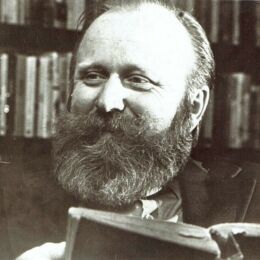
Frank Herbert. Photo courtesy of Wikimedia Commons

Frank Herbert. Photo courtesy of Wikimedia Commons
2,488 words
This talk was delivered on Sunday, October 8th, at a Counter-Currents gathering in the Dallas-Fort Worth area. I want to thank everyone who helped organize the event and everyone who came out to attend. I love Texas and am frankly puzzled by its one-star rating.
It is just a coincidence that today’s gathering falls on the birthday of Frank Herbert, the author of Dune, which is the best-selling and most influential science fiction book of all time. Without Dune, there would be no Star Wars. Without Dune, there would be no Warhammer 40K. (more…)
-

Frank Herbert. Photo courtesy of Wikimedia Commons

Frank Herbert. Photo courtesy of Wikimedia Commons
448 words
Frank Herbert was born on this day in 1920 in Tacoma, Washington. Herbert is best-known as the creator of Dune, which is the most widely-read and influential science fiction novel of all time. Herbert, moreover, is an artist of the Right. As I wrote in my review of Denis Villeneuve’s Dune, Part 1:
Frank Herbert’s vision of the future was deeply reactionary. He depicts a world where liberal democracy failed and has been replaced by a feudal imperium. (more…)
-
267 words / 1:38:00
Greg Johnson welcomed David Skrbina, Ph.D. to the latest broadcast of Counter-Currents Radio to talk about the life and ideas of Ted Kaczynski, a.k.a. the Unabomber. Dr. Skrbina is the editor of Kaczynski’s book Technological Slavery, which includes excerpts from their correspondence, and recently penned an obituary and memoir about their relationship that was published here at Counter-Currents, “A Great Passing: Reflections on 20 Years with the Unabomber.” This is the first part; the second part of the interview is here. (more…)
-
Part 2 of 3 (Part 1 here, Part 3 here)
II. Deserts Create Monsters and Messiahs
“The Bedouin could not look for God within him: he was too sure that he was within God. He could not conceive anything which was or was not God, Who alone was great . . . He was the most familiar of their words.” — Thomas Edward [T. E.] Lawrence, Seven Pillars of Wisdom (more…)
-

You can buy Trevor Lynch’s Classics of Right-Wing Cinema here.

You can buy Trevor Lynch’s Classics of Right-Wing Cinema here.
156 words / 1:52:54
Greg Johnson joined Mark Collett, Natty, and Bill Atheling on a recent broadcast of the Patriotic Alternative Book Club to discuss Trevor Lynch’s Classics of Right-Wing Cinema, a collection of film reviews that delve into cinematic features that are of particular interest to nationalist viewers. An audio recording of the broadcast is now available for download and online listening. (more…)
-
Frank Herbert’s six Dune novels fall into three pairs. Dune (1965) and Dune Messiah (1969) chart the rise and fall of Paul “Muad’Dib” Atreides, a man who becomes a superman and the God Emperor of the known universe. Children of Dune (1976) and God Emperor of Dune (1981) narrate the rise and fall of Paul’s son, Leto II, a superman who transforms himself into a monster and rules for 3,500 years. Heretics of Dune (1984)[1] and Chapterhouse: Dune (1985)[2] are set 1,500 years after God Emperor and focus on the Bene Gesserit Sisterhood’s struggle with their evil twin, a sisterhood that calls itself the Honored Matres. (more…)
-
477 words
Frank Herbert was born on this day in 1920 in Tacoma, Washington. Herbert is best-known as the creator of Dune, which is the most widely-read and influential science fiction novel of all time. Herbert, moreover, is an artist of the Right. As I wrote in my review of Denis Villeneuve’s Dune, Part 1:
Frank Herbert’s vision of the future was deeply reactionary. He depicts a world where liberal democracy failed and has been replaced by a feudal imperium. (more…)
-
August 23, 2022 Greg Johnson
Hitler a abduktivní logika v pojetí Bena Novaka
English original here
Ben Novak
Hitler and Abductive Logic: The Strategy of a Tyrant
Lanham, Md.: Lexington Books, 2014„Nahlédni do své duše a uvidíš, že je to pravda.“
Kniha Hitler a abduktivní logika Bena Novaka je dost možná tím nejvíce strhujícím akademickým titulem, na jaký jsem kdy narazil. Přináší smělou a nápaditou syntézu filozofie, historie, životopisu i literárního umu. (more…)
-
Denis Villeneuve’s Dune, Part I is now in theatres. I can’t recommend it. It isn’t terrible. It is merely mediocre. I found it dull to the eyes, grating to the ears, and a drag on my patience. Villeneuve spends 156 minutes and only gets halfway through the novel. David Lynch told the whole story in 137 minutes. Of course audiences are willing to sit through long movies if they are really good: Peter Jackson’s The Lord of the Rings trilogy, for instance. But this film isn’t in that league. (more…)
-
79 words / 1:00:50
Saturday’s Ask Me Anything with Greg Johnson and Endeavour is now available for downloading and online listening. Topics discussed include:
00:00:00 Indians and white identity in America
00:11:00 Destroying the culture of your enemies
00:17:00 Burying the hatchet for a common cause (more…)
